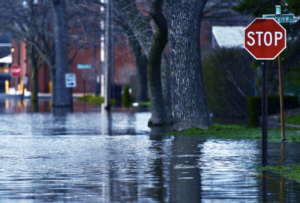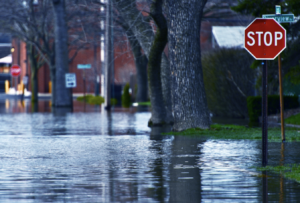The death toll in central Europe continues to climb as ‘dramatic’ flooding grips the region, causing havoc and devastation in its wake. The Czech Republic, Poland, and Austria are witnessing widespread evacuations as thousands of people are moved to higher ground in anticipation of even worse conditions ahead.
Authorities across the affected countries have reported fatalities and warned that the worst may still be yet to come. The death toll from the floods and severe rain in central and eastern Europe has risen to at least 16, with many more individuals still missing and unaccounted for.
In the Czech Republic, tragic incidents have been reported, including the drowning of a woman in Bruntál, a town with a population of around 15,000, after a creek overflowed its banks on Monday. Additionally, seven other people remain missing in the area, adding to the growing concern.
In Austria, reports of casualties have also emerged, with two elderly men losing their lives in the towns of Böheimkirchen and Sierndorf in the northeastern region of Lower Austria. The men were trapped in their homes as floodwaters swept through the area, leading to their tragic deaths.
Further south, in Poland, a surgeon returning from hospital duty drowned in the town of Nysa, while four others lost their lives in the cities of Bielsko-Biała and Lądek-Zdrój. This brings the total number of Polish casualties to six, highlighting the devastating impact of the floods in the region.
The severe weather system, named Storm Boris, has been described as a “catastrophe of epic proportions” by local officials, forcing hundreds of thousands of people to flee their homes across Slovakia, Hungary, Austria, the Czech Republic, and Poland.
Numerous dams have ruptured, streets have been flooded, power outages have occurred, and entire neighborhoods have been submerged in some areas. Residents, such as Judith Dickson from Austria, have expressed shock at the unprecedented scale of the flooding, describing it as unlike anything they have ever witnessed before.
Over the weekend, additional casualties were reported in Romania, Poland, and Austria, with local authorities preparing for potentially catastrophic floods in major towns. Despite an expected decrease in rainfall, concerns persist as some rivers have yet to reach their peak, prolonging the threat of further flooding.
In response to the crisis, Hungarian Prime Minister Viktor Orbán canceled all foreign engagements, while Polish Prime Minister Donald Tusk convened an emergency cabinet meeting to expedite aid to flood victims. The situation has prompted solidarity from neighboring countries, with Germany expressing sadness over the loss of life and offering assistance to the affected regions.
As the Danube river swells, the capitals of Hungary and Slovakia, Budapest, and Bratislava, respectively, are on heightened alert for potential flooding. Austrian Chancellor Karl Nehammer has declared Lower Austria a disaster area, where relief workers have been tirelessly working to evacuate homes and provide assistance to affected residents.
The situation in the flooded regions has been described as dire and worsening by local officials, with Lower Austria experiencing significant challenges. Governor Johanna Mikl-Leitner mentioned the likely hardships faced by many residents, stating that they are likely living through some of the toughest moments of their lives.
Reports from Lilienfeld, a municipality isolated from the outside world, indicate that thousands of families are without essential services, including water and electricity, due to the bursting of several dams. The situation has prompted urgent calls for cooperation and support from both local authorities and residents.
Czech Prime Minister Petr Fiala has urged people to follow the instructions of authorities and emergency services, emphasizing the importance of caution and responsibility during the ongoing crisis. With a significant number of evacuations and widespread power outages, Fiala highlighted the challenges faced by affected communities and the need for continued vigilance.
In conclusion, the ongoing flooding in central Europe has had devastating consequences, claiming lives, displacing thousands, and causing widespread destruction. The region remains under threat as floodwaters persist, and emergency responders work tirelessly to alleviate the impact on residents. International support and solidarity are crucial in the face of this disaster, as affected countries strive to rebuild and recover from the devastating floods.






